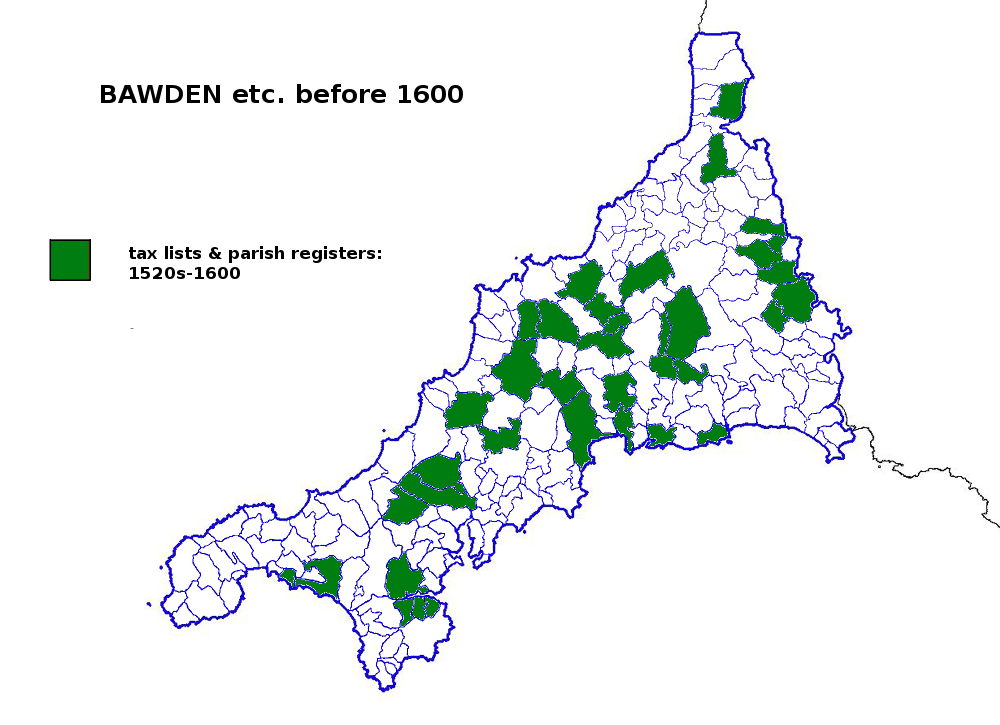Sometimes the surname dictionaries assure us that two similarly spelt names have entirely different origins. The older approach was based on seeking the earliest form of the name and then interpreting its meaning by reference to the languages of the time. This copied the methods of placename studies. However, sometimes the fluidity of surname spellings in former times and the work of surname researchers from the 1990s onwards shows that earlier explanations are just wrong. Moreover, even if origins were different surnames could fall together in their spelling. Surnames and their development can be a lot more complex than research on the name alone might suggest.
Let’s take the example of the two names Bawden and Bowden in Cornwall. These were present in relatively large numbers from the emergence of more comprehensive records in the 1500s. According to the surname dictionaries they have very different origins. Bawden is a patronym – from the Norman name Baldwin. Bowden is a toponym – from an English placename found in several places in Devon and east Cornwall.
In my The Surnames of Cornwall, after some hesitation I accepted this distinction. After creating the maps below of the distribution of these names in the 1500s I’m now even less certain this was the case even at that early date.
The distribution of the names Bawden, then spelt Bawden, Bawdyn or Bawdon, and Bowden, its second syllable also spelt with a variety of vowels, might instead suggest that the two names overlapped considerably. Indeed, almost half of the parishes in which one of the names was found also had examples of the other. More crucially, the large number of Bowdens found in the far west is the opposite of what we should expect from the location of the placename.
This suggests the difference on the ground may well be more about spelling preferences than separate origins. The two names appear to have been interchangeable with one spelling segueing into the other (and producing the shorter form Bodyn or Boden, which began to appear in the east in the 1560s). This process was haphazard, dependent on chance and the whims of clergymen and other clerks. The two names may well have had separate origins but by the 1500s this had already become extremely blurred.



This is a very interesting account.
I did family research into one branch of my family, who were resident for much of the 1800s in the same house and same street in Kearsley near Manchester. In one household, there was a lodger whose first name was Samuel. He lived there for over 60 years during the 1800s. In every single census his surname was spelled differently but it was definitely the same guy. I think this occurred because he was illiterate and because the census takers had no idea of how to spell his name – probably a thick dialect.
Also, I believe surnames were generally not as important for many people compared to today – we have to register ourselves endlessly in a highly literate society. But in those days of thumbprints and less bureaucracy surely surnames were used at very specific times, and the holders were often illiterate, so spelling was the literate person’s best guess.
In the case you discuss isn’t it possible that the toponym was also once a patronym anyway?
LikeLike
Fascinating, and completely convincing. My mother was a Bowden, and we have both Bowden and Bawden in the Imerys Mid-Cornwall Male Choir. Even in the 20th century branches of our Bowden family diverged in pronunciation: ‘ow’ and ‘o’.
LikeLike
I’ve been grappling with this issue for 20 years. After reading “Surnames of Cornwall” last year, I reviewed the 1641/1642 Protestation Returns for Bawden and its spelling variants (80 total households). I found 43% (34 households) of Bawden households were in the two most western hundreds (Penwith and Kerrier) and that 75% (60 households) of Bawden households were in the area west of the line formed by the Camel and the Fowey Rivers (Penwith, Kerrier, Powder, Pydar).
LikeLike
DNA analysis will be a way of sorting out some of these conundrums.
LikeLike